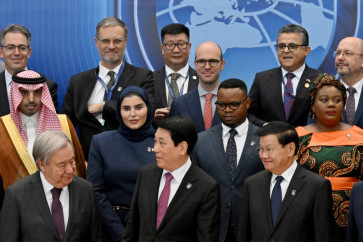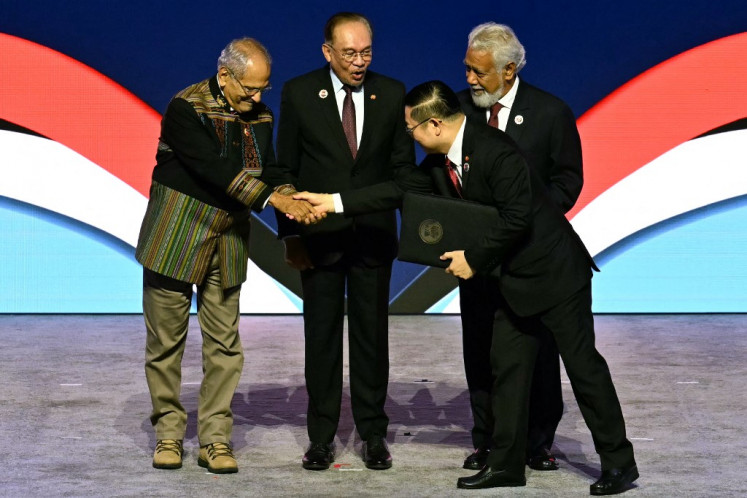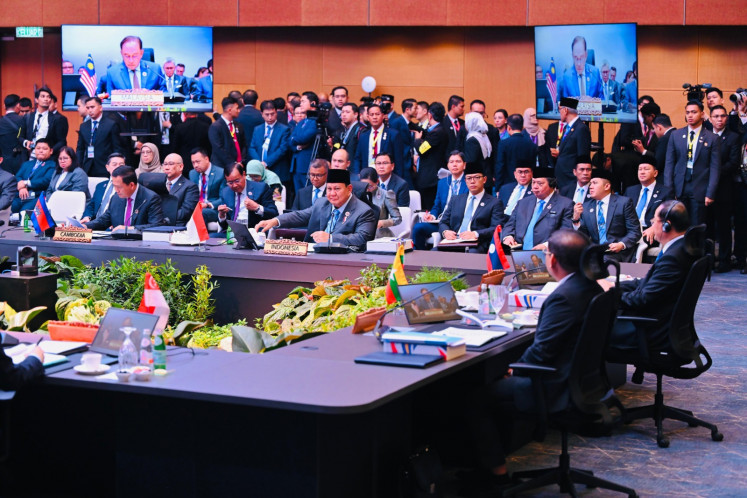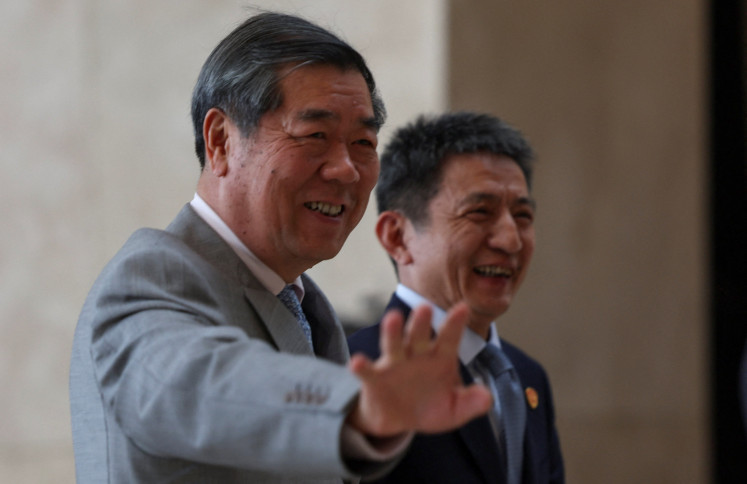Popular Reads
Top Results
Can't find what you're looking for?
View all search resultsPopular Reads
Top Results
Can't find what you're looking for?
View all search resultsBig power rivalry in Asia will affect RI
There is a sharpened power play developing in Asia, which Indonesia ignores at its peril
Change text size
Gift Premium Articles
to Anyone
T
here is a sharpened power play developing in Asia, which Indonesia ignores at its peril. In essence, China's rise has reached a stage where it feels a need to assert its interests more forthrightly than before. This in turn has encouraged other big powers such as the United States and Japan to strengthen their positions in Asia while the smaller Asian nations rethink their national strategies.
The outcome of this power play will have tremendous consequences for Indonesia.
The dominant driver of this political change is China. China's economy has quadrupled in size in the past decade or so, triggering new forces in geopolitics.
First, its greater economic prowess means that China has more substantial and varied economic interests to defend than before. Its hunger for energy and critically important natural resources from around the world is so much greater. It also depends more than ever on strategic sea lanes, which it cannot allow a potential rival power to dominate.
A larger economic base also provides it with a vast amount of resources to build its military and political power.
Second, there has been an important psychological change within the Chinese political elite. As China has risen, it appears to Chinese leaders that the incumbent powers such as the United States, Europe and Japan are in decline. Certainly, the global financial crisis and the European sovereign debt crisis have shown up the weakness of the big powers while Japan has been mired in deflation for two decades.
It would also have struck the Chinese leaders that the only other putative challenger to China ' India ' has so badly mismanaged its economy and politics and is unlikely to pose a material challenge to China for decades to come.
This psychological change has also produced more nationalism within China. In Chinese eyes, its rise appears inexorable, putting China back in the powerful position it had been in for hundreds of years before it started declining in the early 19th century. In the old days, China called the shots in its immediate environs and many Chinese want a return to those days.
As a result, China has adopted a different approach to important issues in Asia ' basically, it sees less reason to defer to smaller Asian nations' sensibilities. In East and Southeast Asia, this shows in how China is now approaching its territorial disputes: It has been more assertive where there are territorial disputes. While Indonesia has no important dispute with China, some of Indonesia's partners in ASEAN have been badly affected.
Vietnam has found that a more powerful China has no compunctions in imposing its territorial claims in areas Vietnam also claims, by for instance, cutting cables being laid by Vietnamese ships. The Philippines has had numerous confrontations with China over rival claims to islands and rocks in the South China Sea.
Even Japan has seen China aggressively sending official ships into disputed waters in the Senkaku/Diaoyu islands to weaken Japan's claims to the same waters. There are legitimate fears that these more intensive naval deployments might result in an unintended clash of some kind.
This change is also evident further away. Because China has legitimate security interests in the Indian Ocean, for example, it is developing naval facilities and listening posts in several locations around the Indian Ocean. This has raised India's fears that China is planning to encircle it.
The second big change in Asia in recent years has been the United States' decision to reengage Asia, in the so-called pivot to Asia. US President Barack Obama has given more attention to Asia and ASEAN since taking office and more recently committed his country to deploy more military forces in the region, including a permanent deployment of more than 2,000 Marines in Darwin, just across the water from Indonesia.
The US is also making greater efforts to woo Asian nations such as India. This has aroused China's suspicions that the US is seeking to contain China.
Other powers involved in Asia are also strengthening their positions in Asia. In Japan, Prime Minister Abe is known to be more nationalistic than his predecessors and keen to amend Japan's constitution to give the military a broader role. Japan's recent defense white paper had fairly forthright comments on Chinese naval activities in the Asian region.
Further away, India has just announced a substantial beefing up of its military capacity along the border with China, with a new force of 40,000 troops to be based near the border, backed up by improved transportation and other infrastructure.
Concerned about their recent confrontations with China, Vietnam and the Philippines are strengthening their military forces, with Vietnam purchasing advanced Russian weaponry and the Philippines expanding its naval assets.
Indonesia cannot remain silent. Its vital interests will be affected in this new Asian power play.
First, it is a large archipelagic country bordering important water bodies where territorial disputes are worsening such as the South China Sea. Second, it sits astride sea lanes of communication such as the Sunda Straits and Lombok Straits, which are critically important to the big powers such as the US and China.
Third, its ASEAN partners are increasingly being forced to take sides in disputes, threatening the integrity of ASEAN, a major plank in Indonesia's foreign and national security policy. An example was the fierce disagreements between Cambodia on side and Vietnam and the Philippines on the other last year over
the wording of a communiqué, which Cambodia felt might offend its ally: China.
If Indonesia's immediate neighborhood became a venue for big power rivalries and major military deployments or worse still if clashes broke out, Indonesia's own national security could be endangered.
Consequently, the time has come for Indonesia to adopt a more proactive role in calming tensions and building frameworks that can help contain these disagreements. Indonesia's successful and constructive intervention in the dispute over the ASEAN communiqué last year strengthened Indonesia's image, giving it an important role as well as greater influence.
It should build on this success to become the neutral and fair arbiter in such disputes.
Beyond that, Indonesia should also promote a regional security framework that will fairly accommodate the interests of all the big powers while also assuring smaller nations that their interests will be protected.
Indonesia can deploy its respected and skilled foreign policy establishment to initiate discussions for such a framework, which Indonesia could even host. In this way, Indonesia can contribute to a more peaceful Asia and one in which its own interests are well take care of.
_____________________
In the old days, China called the shots in its immediate environs and many Chinese want a return to those days.
________________
The writer, former transportation minister (2007-2009), is chairman of the Matsushita Gobel Foundation and president commissioner of PT Telkom. The views expressed are personal.










